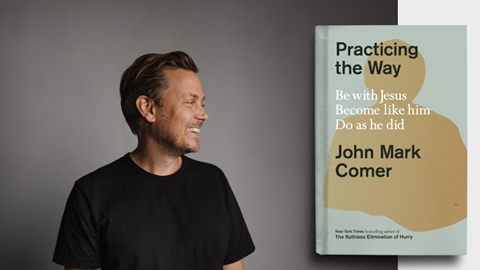When Covid-19 gripped the globe, John Mark Comer’s The Ruthless Elimination of Hurry became a worldwide bestseller. Four years later, his next book offers a transformational approach to walking with Jesus, says Chris Goswami

What if someone told you that most Christians are not following Jesus? That’s what John Mark Comer suggests in his latest book Practicing the Way: Be with Jesus, become like him, do as he did (Form).
He calls this widespread attitude: “salvation by minimal entrance requirements”. We say the sinner’s prayer, show up at church, give some money and occasionally pray. But that doesn’t make you a follower of Jesus, says Comer.
Following Jesus comes at a price, he explains, but there is an even bigger cost to not doing so; we lose out on the fullness of life God has for us. We miss out on the joy of abiding in God. We say “no” to the peace that transcends understanding and the freedom from bondage to sin. We forgo the very purpose for which God created us.
Apprenticing to Jesus means being with Jesus, becoming like Jesus, and doing the things that Jesus did
Becoming a follower - being “formed by Jesus” - is what this book is all about. “We are all being formed by something”, says Comer, meaning we are being shaped by the world – our job, family, online games, Netflix, boy/girlfriends…whatever. Many of those things are fine, even good, but if Jesus was being serious when he said: “whoever wants to save their life will lose it, but whoever loses their life for me will find it” (Matthew 16:25) then “why not become a person formed by Jesus?” he asks.
But how do we do this? Is there a new, secret method? The best part of this book is: no, there really isn’t.
Becoming an apprentice
Comer proposes that being a follower of Jesus today is best encapsulated by the idea of being an apprentice. An apprentice doesn’t simply acquire head knowledge, or show up once a week for a session. Apprenticing is the practical task of learning from the master craftsman. It’s watching what they do and then copying. It’s about training, under the gaze of the master, not trying in our own strength.
Apprenticing to Jesus means “being with Jesus, becoming like Jesus, and doing the things that Jesus did”. It’s not revolutionary – rather, it’s “a summary and synthesis of ancient Christian orthodoxy” repackaged for a 21st century audience.
Comer highlights nine ancient practices that apprentices of Jesus must become trained in, making them relatable and achievable: Sabbath, Solitude, Scripture, Generosity, Prayer, Community, Fasting, Witness and Service. Some may seem daunting, but he provides practical advice on how to start and sustain them.
For example, he advises, start where you are right now, not where you think you should be. In other words, don’t suddenly decide to pray for an hour a day if you’ve never done that. Start with a few minutes. Or, if you can’t stop binging Netflix for two hours a day, “could you give God a tithe of that time back?” And, he suggests the charming idea of “parenting your phone” – putting it to bed at 8pm and not waking it up till 7:30am.
On that most terrifying of spiritual practices, witnessing, he reminds us: “you are not the sales guy closing the deal”. In other words, you don’t have to drag a person to church and force a sinner’s prayer out of their mouth. You only have to witness - and he makes simple suggestions on how to do that.
As followers of Jesus, we learn to abide in Jesus throughout the day, turning our face toward him whether we’re on the morning commute, opening our emails or sipping a cup of tea. Comer calls this: “turning God into a habit” or, as Brother Laurence called it: “practicing the presence of God”.
Planning to follow Jesus
Most people have plans. We plan our finances, work schedules, exercise regimes, meals, education, even our retirement. “But”, says Comer, “very few of us have a plan to be with Jesus, and thoughtfully apprentice under him”.
Here Comer returns once more to an ancient tradition. The “Rule of Life” has its roots in the early Church monastic movements. Simply put, a rule of life is a blueprint for balancing your life around Jesus, taking into account the nine practices, the season of life you are in and the kind of person you are.
Comer points out that following Jesus is not simply a pastime. A Rule of Life isn’t a magic wand, but it is a tried and tested method for committing to follow Jesus intentionally.
Reading this book, I found myself veering between viewing Comer’s instructions and advice as transformational and… impossible. But isn’t that the very essence of Jesus’ call? I’m sure that’s how the first disciples felt as they stood by the Sea of Galilee and considered the merits, and costs, of following this man.
Many of us avoid books like this, because they can seem like yet another way to beat ourselves up for not being good enough. But Comer works hard to make following Jesus practical and accessible in our modern day. I like a book that tries to take the pressure off while simultaneously challenging me to step up.
As followers of Jesus, we learn to abide in Jesus throughout the day
Lastly, while writing this article, something odd happened.
I accidentally stumbled across a Rule of Life that I had written for myself 15 years ago (2009) and completely forgotten. On opening the document and reading the seven ideas from a younger me, I realised I am actually now doing almost all of those things. They were not ground-breaking: reading the Bible, organising a regular family time etc. It wasn’t easy back then yet, somehow, they became part of my life. Today, in a different season of life, it’s time to write a new one.







































1 Reader's comment